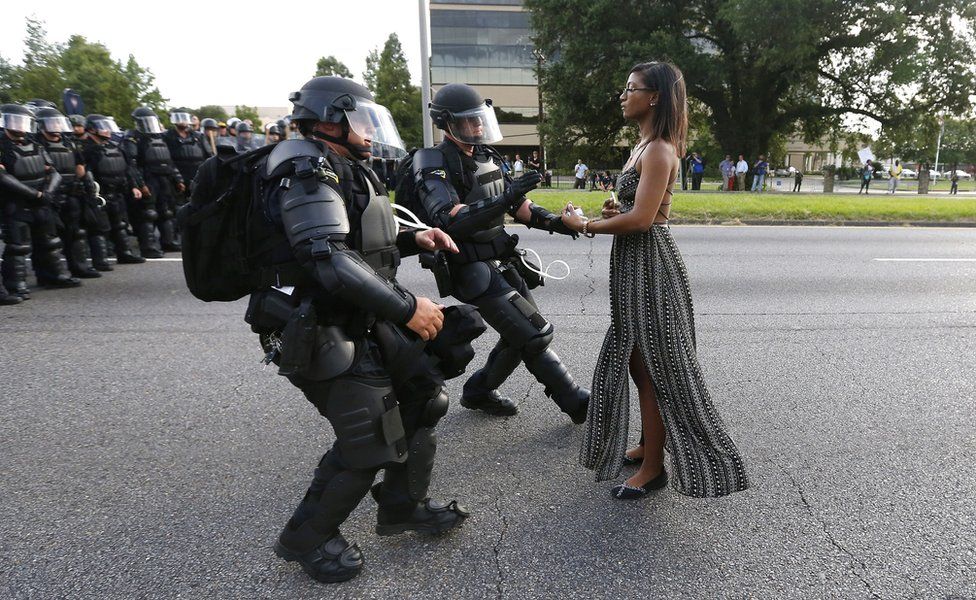This was supposed to be about #AltonSterling.
That would’ve been easy. After years, or decades, if we start the timeline at the Civil Rights Movement, of police misconduct towards Black people, Sterling was the latest hashtag. The Baton Rogue, Louisiana father of five was fatally shot outside of a convenience store where he was selling CDs. We need not be psychics to know what’s coming next.

Sadly, we’ve seen this movie plenty of times. Sterling’s killers will receive a paid vacation; the Feds, Justice Department and/or FBI will come in and investigate; local politicians will come out and promise a full and thorough investigation; we’ll wait with baited breath as the press conference to announce the decision hits the news; we’ll hope that maybe, just maybe, this time will be different; we’ll be let down when they announce that after said full and thorough investigation, no charges would be filed; we’ll be further disappointed when the Feds announce the same; and then we’ll wait for the next name.
#AltonSterling would’ve been easy. That piece has been written by me and lots of other writers for as long as Black resistance has been documenting the movement.
And then the hashtags started stacking up.
#PhilandoCastile. #FalconHeightsShooting. #DallasPD. #FreeDeRay.
Last week we were introduced to Philando Castile, a 32-year-old man shot by a Minnesota police officer during a traffic stop for a broken tail light. We know now that the vehicle Castile occupied with his fiancé and her child did not have a broken tail light, as audio from the police radio reveals the killer cop profiled the pair because of their wide noses (which if you know anything about Black features, is something the vast majority of us share).
“The two occupants just look like people who have been involved in a robbery,” the officer can be heard saying on the recording. “The driver looked more like one of our suspects, just ‘cause of the wide-set nose.”
Last week was a domino effect of emotion and resistance. Sterling and Castile became the latest rallying cries for #BlackLivesMatter. As quickly as we were introduced to them, mainstream media just as quickly shifted the narrative after Micah Xavier Johnson took the lives of five Dallas law enforcement officers following a protest. It is all too convenient to replace #BlackLivesMatter with blue lives matter or all lives matter. America doesn’t like it much when we speak up and out, holding a mirror to the ugliness that is our condition.
Twelve years ago, then Senator Barack Obama captivated the nation during his speech at the Democratic National Convention “There’s not a Black America and white America and Latino America and Asian America; there’s the United States of America.”
If that’s true, if we aren’t the Divided States of America, then the United States of America isn’t such a great place to live. If the state of Black America, or the state of For Blacks in America, since we are all one, is any indication, America has arguably never been a great place to live. From the three-fifths compromise to target practice for killer cops, Black women, men and children have never been recognized as fully human, outsiders in a country we helped build.
Across the country, protesters took to the streets.
“No justice, no peace!”
“Hands up, don’t shoot!”
“Black lives matter!”
But if we are to be totally honest, getting the police to stop killing us would be both a revolutionary act and an appallingly low standard of survival for citizens of the alleged world’s greatest country.
I tell people often that Black America, while far from a monolith, is as reasonably as good as we can expect it to be.
In a utopian society, what if we get the police to stop killing us? We’ll have Black mothers who deliver Black infants who are 2.2 times more at risk for early death than their white counterparts.
For those that survive, they are likely to live in areas where the air is dirty and the water is tainted. More likely to attend our worst public schools and be taught by inexperienced teachers. Those that win the charter school lottery are still more likely to be suspended than their white peers. Or more likely to go to a school that strips away their individuality via a school uniform. Or told their hair isn’t fit for the work place.
For those that graduate high school and college, they’ll enter a job market where their ethnic names are less likely to receive call backs and given the same consideration as a white applicant that happens to be a felon.
For those that make it through the obstacles of childhood, graduate college and get the sometimes elusive “good job,” wealth building won’t come through the American dream of home ownership. And for those that make it through all of those obstacles and birth Black children, the cycle begins again.
Year after year, generation after generation, we hear the stories of athletes, celebrities, entrepreneurs and rank and file college grads that talk about “making it out” of their neighborhoods. But rarely do we ask the question of why we have neighborhoods we have to make it out of in the first place?
Alton Sterling would’ve been easy to write about. Philando Castile would’ve been easy. But if we can get the police to stop killing us, we need a quality of life that doesn’t leave us sprinting towards death.
Surely, the greatest country in the world can do better.
Right?